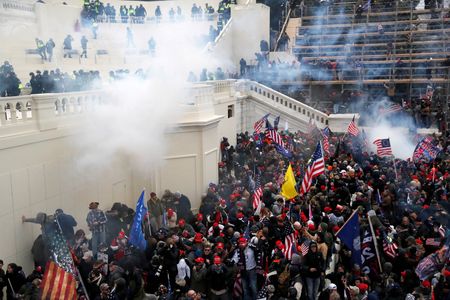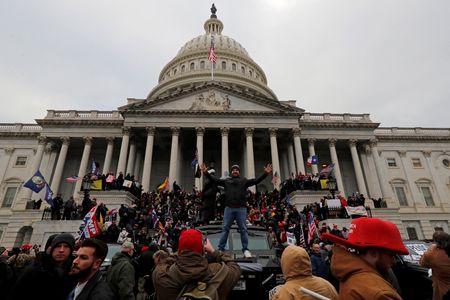WASHINGTON (Reuters) -A new report detailing intelligence failures leading up to the Jan. 6, 2021, attack on the U.S. Capitol said government agencies responsible for anticipating trouble downplayed the threat – even as the building was being stormed in an attempt to stop Congress’ certification of Joe Biden as the 46th president.
The 105-page report, issued Tuesday by Democrats on the Senate Homeland Security and Governmental Affairs Committee, said intelligence personnel at the FBI, the Department of Homeland Security (DHS) and other agencies ignored warnings of violence in December 2020.
Subsequently, they blamed each other for failing to prevent the attack that ensued on Jan. 6, which left more than 140 police officers injured and led to several deaths.
Since then, the U.S. government has won hundreds of convictions against the rioters, with some getting long prison sentences.
“These agencies failed to sound the alarm and share critical intelligence information that could have helped law enforcement better prepare for the events” of Jan. 6, said Senator Gary Peters, the chairman of the committee issuing the report titled “Planned in Plain Sight, A Review of the Intelligence Failures in Advance of January 6th, 2021.”
Republicans on the committee did not immediately respond to requests for comment.
A Department of Homeland Security spokesperson said in a statement that since early 2021 the agency has taken “steps to enhance its capacity to collect and produce intelligence about homeland security threats” while protecting privacy and civil rights. It also has enhanced staff training and supervision of intelligence activity collection, the statement said.
Last summer, a special House of Representatives committee held multiple hearings, following a long investigation, in which it concluded that Republican then-President Donald Trump repeatedly ignored top aides’ findings that there was no significant fraud in the November 2020 presidential election, which he lost.
Trump has continued to falsely insist he won that contest and was the victim of a massive election fraud effort by Democrats. Just hours before the riot, Trump delivered a fiery speech to a large gathering of supporters, urging them to march to the Capitol as the House and Senate met in a joint session to certify the victory by Biden, a Democrat.
Trump currently is seen as the leading candidate to win the 2024 Republican presidential nomination. He and some of his Republican rivals have pledged to grant or consider granting pardons to rioters serving prison sentences if elected.
Among the committee’s findings:
In December 2020, the FBI received information that the far-right Proud Boys extremist group planned to be in Washington “to literally kill people.”
Intelligence agencies on Jan. 3-4, 2021, knew of multiple postings on social media calling for armed violence and storming the Capitol. Yet, “as late as 8:57 am on January 6 a senior Watch Officer at the DHS National Operations Center wrote “[t]here is no indication of civil disobedience.”
By 2:58 p.m., the report noted, with a riot declared and the Capitol in formal “lockdown” mode, DHS’ Office of Intelligence and Analysis noted online “chatter” calling for more violent actions “but at this time no credible information to pass on has been established.”
During the summer of 2020, demonstrations were staged in several U.S. cities after the murder of George Floyd, a Black man, by a white Minneapolis police officer during his arrest.
The Senate report noted that the Office of Intelligence and Analysis had been criticized then for “over-collecting intelligence on American citizens,” resulting “in a ‘pendulum swing’ after which analysts were then hesitant to report open-source intelligence they were seeing in the lead-up to January 6th.”
The report concluded there is a “clear need … for a reevaluation of the federal government’s domestic intelligence collection, analysis, and dissemination processes.”
(Reporting by Richard Cowan; editing by Jonathan Oatis)






